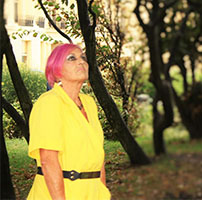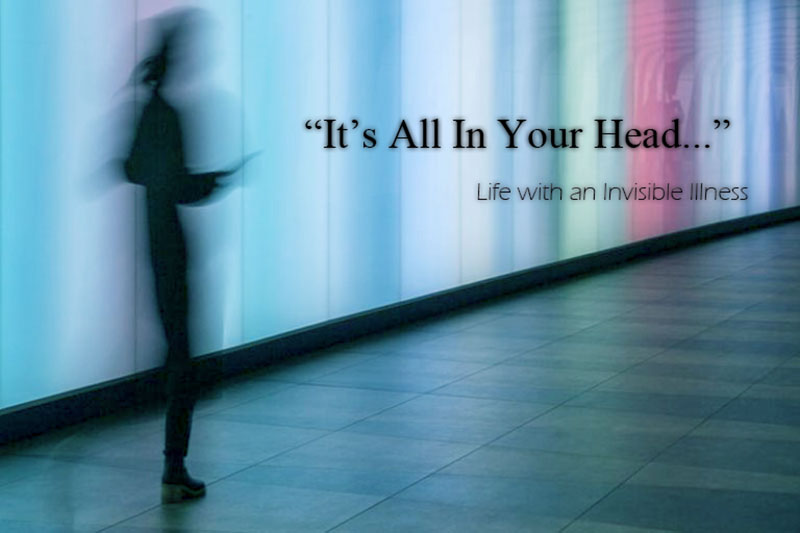Invisible illness is considered a chronic illness or disease that affects a person to a debilitating degree, only we don’t look sick. One hundred and seventeen million adults in the USA are suffering from Chronic Illness. Ninety-six percent of those have an illness that is invisible, they show no outward signs of being ill at all. Ninety-six percent! Think about that for a minute. That means two out of the four adults around you–your family, your friends–have an invisible illness and are suffering internally, while forced to wear a mask of good health to blend in so that others can’t see their pain.
It doesn’t have to be this way. As with anyone, we all have needs. However, with an invisible illness, the most important need we have is your understanding. That simple smile of understanding can make a huge difference in a person’s life and wellbeing. We all need you to realize that it’s not in our heads, that we can’t just think positive thoughts and wish it all away. Would you tell someone with cancer to do that? Of course not. So why then would you ask someone with an invisible physical or mental illness to do that? We shouldn’t have to look ill to be understood. So next time someone cancels an appointment with you, calls in sick for work, or simply can’t get out of bed that day; your understanding, sympathy, and friendship will make a huge difference in their life.
We aren’t looking for pity, we get plenty of that, what we are looking for is awareness and sometimes just a simple hug.
With that said, let me introduce this week’s Voice of Invisible Illness
Cireena Simcox from the UK: Invisible Illness- Bipolar Disorder

Last week I failed a mental health interview.
Now until recently, the concept that in order to get treatment, one must sit an interview with a total stranger – whose qualifications for making decisions that can rock your world are not displayed – would have seemed like a dystopian or sci-fi scenario to me, but then I became caught in the coils of the NHS (the UK’s health system) mental health service. That’s when everything I’ve ever learned turned upside down.
But the ostensible reason for this last failure (there’ve been others) was, it appears, purely sartorial.
“Bloody ‘ell” a neighbor snorted. ”You shoulda come to me – I’d have sorted you out.” And she showed me the enormous, grayish, tracksuit trousers of her husband’s that she wore for these occasions; the gray socks and the cheap trainers.
Someone else informed me it was a good idea not to wash or brush your hair before the interview.
Because mental health workers themselves are relying on overwhelmingly visible signs to evaluate an illness that has no reliable visible indicators?
In this last interview, I was initially surprised when I was met by my interlocutor in the public waiting room, with a comment on how I looked.
I was surprised by my surprise itself, until I realized that, in almost a lifetime of being Bipolar, I had never had a shrink, or counselor, refer to how I LOOKED. Because it’s irrelevant. How can what one sees inform upon how someone is? (Which is probably how some of the totally psychotic priests and nuns of my youth escaped detection. How could one see with their eyes,if one of them was mentally ill?)
This then is not a counselor? I wondered. (By now I am used, like Alice in Wonderland, to following very busy strangers down corridors, for purposes that are not immediately clear to me.)
And no. He was the person who decides if I need a counselor. How can he know? I thought uneasily.
Indeed, my yellow dress (five quid in a 2nd hand shop) with its black buttons; and the 10-year-old black sandals which had escaped the fire that destroyed every other thing I owned in the world, fit together nicely and the man, with the best of intentions, may have thought he was being complimentary and boosting my spirits.
BUT, I COULDN’T CARE LESS.
And I wanted to jump up from my chair and declaim loudly, angrily, and very dramatically:
“What are you doing looking at her? Look at me! I’m here – jumping up and down inside that yellow shroud. Help me.”
I didn’t, of course. Instead the words “We can’t help you” block any palliatives that follow. It’s been 16 months since I broke down. All I seem to have heard since then are those words “We can’t help you,” ricocheting around in my head. Daft, isn’t it? Which, of course, is exactly the point.
I cannot manufacture pustules or scabs, or even cracks in bones or inflamed muscles which cause one to lurch or limp or otherwise fit an accepted criteria for ill-health.
Neither can I fit myself into the cold, analytical numbers which prescribe that if I tick the correct answers I get the treatment I need. No matter how I look when I’m ticking said boxes.
The face of mental illness? What it looks like? In Brighton, it’s the faces peering out from nighttime doorways, or following young girls with a knife, or beheading cats. Or slopping around in her husband’s tracksuit bottoms.
But the reality of much of mental illness? It wears a yellow dress with black buttons. And inside it is bleeding and raw and angry. It sits next to you on the bus, and exchanges pleasantries over the counter, and searches for those with the magical glasses that can see it.
This is the first time, EVER, I have been in this situation without drugs, support or (as yet) therapy. I am not any ‘better’ than I was when I first asked for help.
I’m lost. And confused. Saying “What’s the Matter?” or “What’s happened?” makes me embarrassed and angry. “Nothing ELSE has happened.”
I want to scream: “I’m broken, goddammit: THAT’S what what’s the matter.”
A few thoughts:
- Doesn’t matter if you’ve had 10 bipolar friends or 2, their symptoms, their thresholds, the severity of their illness are all different.
- It isn’t chicken pox. You can’t point to symptoms – like spots and a high temperature – and say “That’s what bipolar looks like.”
- The symptoms are not always evident …but they are ALWAYS there.
- One learns to control them – drugs, therapy, support, and, yeah, strength.
- When a bipolar person has a breakdown they can no longer control those symptoms. They have lost control. They have let the illness take control. And IT’S SCARY AS FUCK! Because if you don’t start getting control you slip into total madness. And you don’t come back.
- Breaking down completely doesn’t happen often. Only a few times in a lifetime. The rest of the time one has “episodes”. Getting totally broken takes years.
- No single thing causes one to get broken. Not dog-poo in the garden. Not some terrible tragedy. These things just act as a trigger. (Once it was just the vacuum cleaner chord! )
For more information on Bipolar Disease please visit the links below:
Bipolar Disorder: finding help

Thank you, Sherri. This is terrific, and the more we talk about invisible illness the better. So many of us are affected by these illnesses, at least at some point in our lives. As someone who dealt with serious eating disorders for fifteen years, I have some sense of what it’s like to move through the world feeling terrible, despite the fact that absolutely nobody else knows. It’s a lonely thing.
You wonderful women are all amazing. I just pray to have the gift of the magical glasses. xo
Thank you for your comments Jackie.
I love being able to share the voices of Invisible Illness, I just wish we all weren’t so misunderstood. The fact that so many people of us, myself included, are turned away for health benefits because we don’t look the part is ludacris. We need to educate the healthcare community, stop turning people away because we’re having a good hair day. They wouldn’t judge someone with cancer like that, so why diabetes, mental illness or any other multitude of invisible illnesses. It’s insanity! Hopefully, sharing all of our stories, one by one, we can help people realize that you don’t have to look sick to be sick. <3
Thank you Nicole for your comments, and all you do for invisible illness. I agree, it is way to common for people in the medical field to judge us because we look healthy. From Doctors to Pharmacists, and even to friends, they all think just because we look healthy that we are healthy. The stigma has to end! The shared stories in this series are hopefully shedding a little light on what it’s like to live with an invisible illness. Maybe, if we educate the masses, one story at a time, we can help share awareness. Some one tweeted me the other day saying one story isn’t going to change anything. That’s true, but look at an ocean- it started with a multitude of drops. We are just individual stories, like rain drops, building our ocean of awareness for Invisible Illness.
Thank you, Sherri for featuring Cireena in your invisible illness series. As someone diagnosed with Manic Depression, I found myself holding my head, and shaking it back and forth at the same time. Mental Illness does not discriminate, although I have found the system does, and is beyond broken. I’m so pleased, and proud you are using your platform to give voices to all the invisible illnesses by educating and informing others. I hope and pray Cireena gets the help she so deserves. She is as she stated, STRONG, and brave.
X – Jackie
Thank you, Sherri for this series and for featuring Cireena today. This, “Someone else informed me it was a good idea not to wash or brush your hair before the interview.” is so common on my page when people ask questions regarding appointments or disability and the followers add their experiences. It certainly is a very sad state of affairs.
I hope Cireena finds the help she deserves and the ignorance surrounding all invisible illness begins to fade. What you’re doing here, educating others and providing a platform for voices, does a lot to make things better.
Thank you again,
N